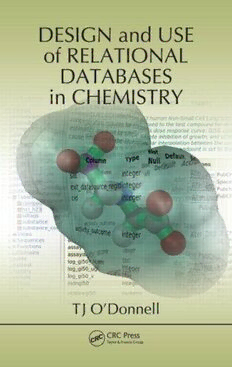Download Design and Use of Relational Databases in Chemistry PDF Free - Full Version
Download Design and Use of Relational Databases in Chemistry by TJ O'Donnell in PDF format completely FREE. No registration required, no payment needed. Get instant access to this valuable resource on PDFdrive.to!
About Design and Use of Relational Databases in Chemistry
Relational databases and the relational model are far from new concepts, having first appeared 40 years ago. When we think of where data lives, we usually think of it residing in a relational database of some sort. However, there are domains like chemical informatics where the uptake of these databases is uneven - there are still many cheminformatics scientists who have never written a line of SQL, and still rely on antiquated models of large dataset handling and storage - like flat files in a unix system. This book aims to change that. From the first sentence of chapter 1: "The goal of this book is to convince you that relational databases are the best way to store, search, and even operate on chemical information." By the time I had finished reading this book, I was indeed convinced. From the fundamentals of relational databases, to SQL, to IT considerations like client/web applications and how to store, search, and manipulate data, O'Donnell moves on to cover how chemistry is actually represented in such databases and what you can do with it. To make this practical he discusses how to implement an actual chemistry Relational Database Management System (RDBMS) in PostgreSQL, a popular open-source RDBMS. The book is a manageable size - 229 pages - which seems about right, of which 35 or so comprise 9 very helpful Appendices including lots of code snippets, which for me are the best way to learn. This is the kind of book I still keep out on my desk for reference to things like Table A.4 in the back. While this may seem too esoteric to some readers, it is to me an invaluable resource describing the SMARTS (a chemistry substructure specification language) implementation of one of the most popular sets of chemistry "keys" used in cheminformatics practice. Someone so inclined could learn much of the SMARTS language just by studying how these 166 keys are encoded by SMARTS strings. Readers will probably find numerous other things of this nature in the book that can be applied to their own work. O'Donnell has made a valuable contribution to the domain of chemical informatics, and I hope he convinces others of the power of relational databases in chemistry.
Detailed Information
| Author: | TJ O'Donnell |
|---|---|
| Publication Year: | 2009 |
| ISBN: | 1420064428 |
| Pages: | 248 |
| Language: | English |
| File Size: | 2.201 |
| Format: | |
| Price: | FREE |
Safe & Secure Download - No registration required
Why Choose PDFdrive for Your Free Design and Use of Relational Databases in Chemistry Download?
- 100% Free: No hidden fees or subscriptions required for one book every day.
- No Registration: Immediate access is available without creating accounts for one book every day.
- Safe and Secure: Clean downloads without malware or viruses
- Multiple Formats: PDF, MOBI, Mpub,... optimized for all devices
- Educational Resource: Supporting knowledge sharing and learning
Frequently Asked Questions
Is it really free to download Design and Use of Relational Databases in Chemistry PDF?
Yes, on https://PDFdrive.to you can download Design and Use of Relational Databases in Chemistry by TJ O'Donnell completely free. We don't require any payment, subscription, or registration to access this PDF file. For 3 books every day.
How can I read Design and Use of Relational Databases in Chemistry on my mobile device?
After downloading Design and Use of Relational Databases in Chemistry PDF, you can open it with any PDF reader app on your phone or tablet. We recommend using Adobe Acrobat Reader, Apple Books, or Google Play Books for the best reading experience.
Is this the full version of Design and Use of Relational Databases in Chemistry?
Yes, this is the complete PDF version of Design and Use of Relational Databases in Chemistry by TJ O'Donnell. You will be able to read the entire content as in the printed version without missing any pages.
Is it legal to download Design and Use of Relational Databases in Chemistry PDF for free?
https://PDFdrive.to provides links to free educational resources available online. We do not store any files on our servers. Please be aware of copyright laws in your country before downloading.
The materials shared are intended for research, educational, and personal use in accordance with fair use principles.

